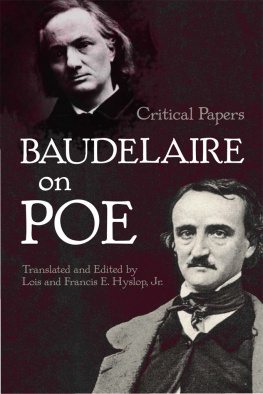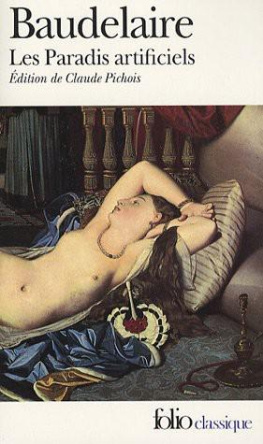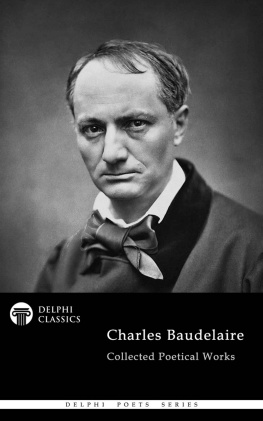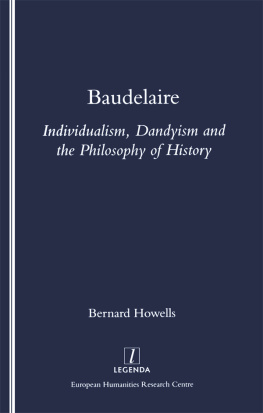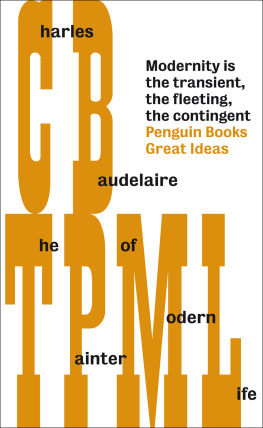Fanfarlo
A Paradoxical Character
Samuel Cramer, who authored some of his Romantic follies as Manuela de Monteverde, in the good old days of Romanticism, is the contradictory product of a pallid German and a brown Chilean woman. Add to that double origin a French education and literary refinement, and you will be less surprised, if not satisfied and edified, by the weird complexities of that character. Samuel has a noble and pure brow, eyes that glow like drops of coffee, a nose that tantalizes and taunts, impudent and sensual lips, a square and tyrannical chin, a pretentiously Raphalesque hairstyle. He is at once a great lazybones, pitifully ambitious, and famous for unhappiness; for his entire life he has had practically nothing but half-baked ideas. The sun of laziness, which ceaselessly glows within him, vaporizes him and gnaws away that half-genius that heaven bestowed upon him.
Among those half-famous notables I have known in that horrifying Parisian existence, Samuel was, more than all the others, the man of failed works of beauty; a fantastical and sickly creature, whose poetry shines forth much more in his person than in his works, and who, around one oclock in the morning, between the dazzling of a coal fire and the clocks tick-tock, always seemed to be the god of impotence, a modern and hermaphrodite god, so colossal an impotence, so enormous, reaching epic proportions!
How to make you aware, and make you understand quite clearly that murky nature, colored with lively flashes, both idle and enterprising, prolific in difficult plans and in ludicrous miscarriages; the sort of mind in which paradox takes the shape of navet, and whose imagination was as vast as absolute solitude and absolute indolence? One of Samuels most natural failings was to deem himself the equal of those he could admire; after an impassioned reading of a beautiful book, his unwitting conclusion was: now that is beautiful enough for me to have written! and, in only the space of a dash, from there to think: therefore, I wrote it.
In todays world, that sort of character is more widespread than we think; such beings teem on the streets, in public walkways, taverns, and all the refuges for strollers. They identify so well with the new pattern that they almost believe they invented it. Here today they are painfully unraveling the mystical writings of Plotinus In fact they are so happy in each of their metamorphoses that they are not at all angry at those fine geniuses for being the first to win the esteem of posterity. Nave and respectable effrontery! Such was the unfortunate Samuel.
By birth a very respectable man and, something of a scoundrel in order to pass the time, by temperament an actor he staged unsurpassable tragedies, or, more exactly, tragicomedies, for himself and behind closed doors. It must be acknowledged that he felt touched and titillated by cheerfulness, and that our man practiced how to roar with laughter. When some memory would make a teardrop well up in the corner of his eye, he would go to the mirror and watch himself weep. If some woman, in a fit of childish and brutal jealousy, scratched him with a sewing needle or a pocket knife, Samuel boasted to himself that he had survived a dagger attack, and when he owed some poor wretches 20,000 francs, he shouted joyously: What a sad and miserable destiny to be a genius plagued by a million debts!
On the other hand, do not believe that he was unable to recognize genuine emotions, and that passion no more than brushed his epidermis. He would have sold his shirt for a man he hardly knew, and whom, just yesterday, he had established as his intimate friend after inspecting his brow and his hands. He brought to matters of mind and soul the idle contemplation of Germanic natures, in matters of passion he brought his mothers swift and fickle fervor, and in practical life all the failings of French vanity. He would have fought a duel for an author or an artist who had been dead for two hundred years. Just as he had been fiercely devout, he was a passionate atheist. All at once he was every artist he had studied and every book he had read, and yet, despite that actors gift, he remained deeply original.
He was still the sweet, capricious, lazy, fearsome, learned, ignorant, slovenly, and well-dressed Samuel Cramer, the Romantic Manuela de Monteverde. He adored a male friend as he would a woman, loved a woman like a pal. He possessed the logic of finer feelings and knew all the intricacies of all sly tricks, and yet he never succeeded at anything, because he believed too much in the impossible. Whats astonishing about that? He was always in the process of conceiving it.
Madame de Cosmelly
One evening, Samuel had the idea to go out; the weather was pleasant and scented. Following his natural taste for excess, he had equally violent and persistent habits of imprisonment and unruliness, and for a long time he had remained faithful to his abode. His mothers laziness, the Creole indolence that flowed in his veins, prevented him from suffering from the mess of his room, his laundry, and his dirty and extremely snarled hair. So he combed his hair, washed, and in just a few minutes was able to take on the clothing and the composure of people for whom elegance is a daily thing; then he opened the window. Hot, gilded daylight rushed into the dusty room. Samuel was astonished at how springtime had arrived so quickly in just a few days, and without giving any shouts of warning. Balmy air permeated with lovely aromas opened his nostrils, some rising to his brain, filling it with reverie and desire, some licentiously stirring his heart, stomach, and liver. He resolutely snuffed out his two candles, one of which was still quivering on a volume of Swedenborg, and the other expiring on one of those shameful books beneficial only to minds possessed by an excessive taste for the truth.
From the summit of his solitude, cluttered with paperwork, paved with books, and populated with his dreams, Samuel often noticed, as he walked on a path in the Luxembourg Gardens, a shape and a face he had loved yesteryear in the provinces, at the age when you are in love for its own sake. Her features, although matured and fattened by some years of practical life, had the deep and decent grace of a respectable woman; from time to time there still glowed in the depths of her eyes the moist reveries of a girl. She would walk back and forth, usually escorted by a rather elegant maid, and whose face and bearing suggested that she was a confidant or a ladys companion instead of a domestic servant. She seemed to seek out forsaken places, and she would sit sadly with a widows bearing, sometimes holding in her distracted hand a book she didnt read.
Samuel had known her in the vicinity of Lyons, young, quick-witted, playful, and thinner. By dint of watching her and thereby recognizing her, he had recovered one by one all the tiny memories associated with her in his imagination; he had recounted to himself, detail by detail, this whole young novel, which, since that time, had gotten lost in his lifes worries and in the labyrinth of his passions.
That particular evening, he greeted her, but more carefully and with more attention. As he passed in front of her, he heard this fragment of dialogue behind him:
Marietta, how do you like that young man?
But it was spoken with such a casual tone of voice, that the most mischievous observer would have found nothing in it to hold against the lady.
Well, Madame, I like him quite well. Does Madame know that he is Monsieur Samuel Cramer?
And with a harsher tone of voice: Marietta, how do you know that?
* * *
That is why the next day Samuel took great care to bring her handkerchief and her book, which he found on a bench, and which she had not lost, since she was nearby, watching the sparrows fighting over crumbs, or appearing to contemplate the vegetations inner processes. As often happens between two beings whose conspiring destinies have elevated their souls to an equal harmony, starting the conversation rather brusquely, nevertheless he was weirdly lucky enough to find a person inclined to listen and to answer him.


